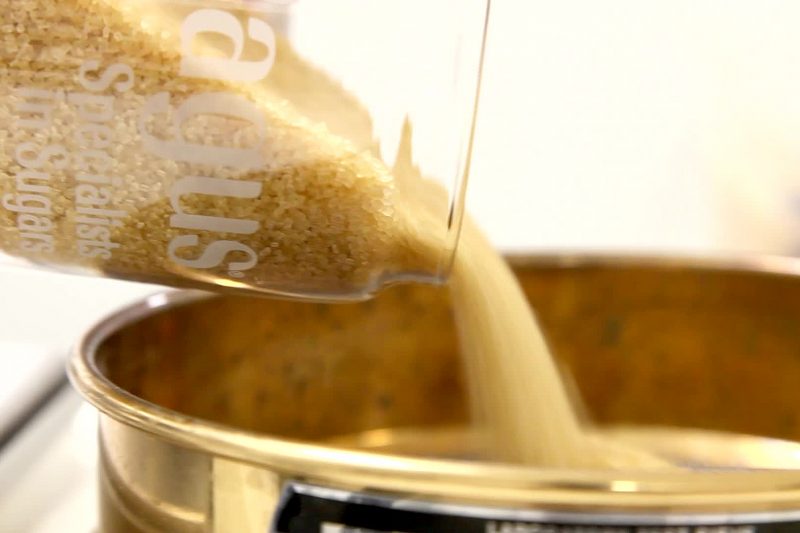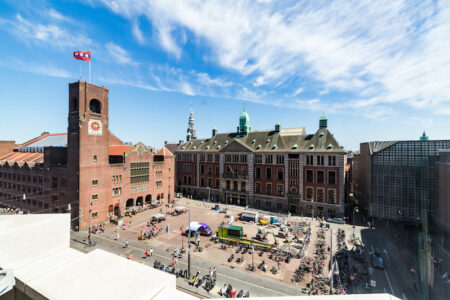Sweet like sugar

Since moving to its new factory in Slough, UK in 2011, pure sugars and syrups supplier Ragus Sugars has started to accelerate in terms of turnover and tonnage, increasing 35 per cent to £21 million ($27.2m) in 2015 and 32,000 tonnes respectively. New equipment has also allowed it to be more efficient with energy, wastage, processing time and process flow.
With the plant capable of producing around 50,000 tonnes per annum, director Ben Eastick believes there is room for expansion through efficiencies. “At the moment, we run five days a week. So we could run a night shift and run at weekends if we need to expand that capacity.”
Responsible for the company’s marketing, Eastick also buys and sources its speciality sugars. Having spent four or five years in the laboratory making the product before taking on other responsibilities, he believes knowledge is key to building a successful business. “That’s vital when you go out and sell, and moving forward to where we are now – trying to strategise the business and move it forward.
“It’s vital as an ingredient to know how can we make cost savings and how can we make efficiencies on energy. You can’t buy that kind of knowledge.”
Increasing market share
The majority of Ragus’ business is to the bakery industry, including biscuit, cake, flapjacks and cereal manufacturers. This is followed in close ratio to one another by the pharmaceutical and brewing industries.
But according to Eastick, it is the confectionery side of the business that has the biggest growth potential, which is currently five per cent of turnover. This, he says, is mainly because it is only Ragus and Tate & Lyle that know how to make treacles by scale and they are messy to handle so people don’t want to get involved. “Molasses is a very volatile product so it can be highly fermentable, explosive and it corrodes plants so people are wary of it. You have exothermic reactions with molasses so you’ve got to be careful with how you handle it, heat it, cool it and store it.”
Supplying treacles into the confectionery industry is the direction Ragus wants to go in, but growing this side of the business is not without its risks. “We want to do more of that, but you need certain types of treacle and raw material molasses to make treacles to the right flavour profile, and getting hold of the right molasses for the industry is a challenge.”
With the population in Asia eating more meat every year, farmers in the region need molasses as a feed stock for cattle, which is putting extra demand on the global molasses supply. As a result, Eastick suggests there is a cap on how much Ragus would want to supply because of the risk to its raw material supply globally. In addition, the taste profile can change based on the crop each year so it’s not necessarily consistent.
“So even if you have got your supply, it doesn’t mean the next year it’s going to be the same flavour profile,” he explains.
Another area Ragus is looking to develop further is the production of clearer syrups, and moving to its new factory has allowed the company to do that. “Before we wouldn’t entertain getting business with Pepsi or Coca Cola because they wanted water white syrups and we couldn’t offer absolute water white syrups,” Eastick tells Confectionery Production. “Now we’ve got the ability to do that at this new plant. So we want to push into the area of making water white syrups and increasing those sales.”
Education
Ragus has started to do a lot more with cereals by making inclusions. However, with consumers being urged to reduce their sugar intake, the consumption of sugar per head in Europe has gone down, according to Eastick, but globally it has risen because of Asian markets.
In terms of the sugar versus sweeteners debate, he says, “It’s all about education. You’ve got to remember that when you’re using sweeteners, that suppresses the production of the hormone lecithin.”
Lecithin tells the brain when it’s had enough carbohydrate, Eastick says, but with sweeteners the brain doesn’t receive that signal. “Sensible eating, natural products and exercise are key. They always have been and always will be.”
But, he adds, “It’s not only about education, it’s also that the government should stop the sales of confectionery products being pushed in our faces.”
This refers to the amount of confectionery products on display in shop aisles near the counter where consumers pay for their products. “It’s a difficult one, but I think overall people will come round to the fact that sugar is actually a vital ingredient and it’s all about moderation.”
Sugar reform
Commenting on the European Union’s abolition of sugar beet quotas, which will come into effect in October 2017, Eastick says, “At the moment, we’re restricted on how much white sugar we can sell onto the world market, whereas pre-Common Market we were one of the largest suppliers.
“Post October 2017, we will again be one of the largest suppliers of white sugar onto the world market.”
Eastick adds, “What is interesting is when we can export as much white sugar onto the world market as we like, that in effect could control the price of what we’re paying within the EU, which in theory will put the price up. It depends on production levels and world market levels.
“At the moment, we’re going into deficit in supply on the world market, which means in theory if we had free access at the moment, we’d be trying to pump as much as we can onto the world market. But if the world market will pay a high price for the white sugar, then obviously the European refineries will try and push that onto the world market, which then potentially leaves a shortfall for the European market.”
Brexit impact
The UK’s decision to exit the EU earlier in June will also present opportunities and challenges for Ragus.
While it is still unknown what will happen post reforms, Eastick says, “In theory, we won’t have to pay any import duty on raw sugar, which will favour us as we could export as much white sugar as we want onto the world market from the UK, and we could sell to Commonwealth countries.”
For Ragus, the challenge is figuring out how it can best make gains in the market and take advantage of those situations. However, Eastick warns, “If we manage to keep the free trade zone with Europe, that will add another complexity because it might be that you have to maintain the sugar policy if you want your free trade zone.”
With a 39 per cent share of the specialist supply in the UK market, Eastick believes “there’s a lot more for us to go and get”. That is what the company is focused on, as well as increasing exports, which account for seven per cent of its turnover. “We’ve got to saturate our home market,” he notes.
Strategy
From heading into London to visit marketing people, to flying to Europe to see suppliers, Eastick tries to work from home at least one day a week. “It allows me to be creative and strategise for the business,” he explains. “That’s very important – something we never did when we were younger was strategise because we were out being sales people getting business.”
“Now the business has morphed into something much bigger than it used to be, we have to strategise.”
This, he says, includes working out as a business how to deal with the sugar reforms and the latest legislation. “As you get older and as the business grows, you’ve got to strategise more.”
He explains, “The business is constantly changing. We’ll find that we’ll spend a long time doing one type of activity in one area and then after two years it changes, and it goes to another area or the business activity has to be different to suit that need. We get bursts where we might be doing sourcing so travelling overseas to mills or sugar plantations.
“You might do that for a couple of years and actually the work you’ve done then tumbles out and you’ve got a stable supply source for five years. Then something happens and it all gets thrown up and you’ve got to go back and find new sources.”
Ragus is also changing the way it manages its operations. Eastick says the company is starting to do more business where it doesn’t actually touch the product. “What we’re doing is getting suppliers to bring in sugar into Europe and when it’s brought in it is then processed there and sent direct to the client because it can be more cost effective.”
But, he says, this needs auditing and processes need to be put in place so that their operation mirrors what Ragus is doing in the UK.
“Things are constantly changing and you’ve got to adapt to it. We have a potential to do a lot more crystalline sugars here now in terms of blended sugars as currently white beet sugar has been very cheap. It’s still a lot cheaper than raw sugar so clients are asking us to make brown sugar out of white sugar where you’re putting on a pre-mix blend.”
Outlook
Expansion and development are key to Ragus’ future outlook. “I think you’ve got to move forward all the time, otherwise you go backwards,” Eastick explains.
There has been huge contraction in the European sugar industry over the last ten years in so there are lots of amalgamations going on, including buyouts and joint ventures, he adds. Although the owners of Ragus would like the business to remain independent, Eastick believes the company will have to form a joint venture of some kind, but in what capacity, he is unsure. “I see our market position growing in the UK,” he explains. “I see it getting stronger in Europe, but I think to get stronger in Europe, we’ve got to be joint ventured with someone to allow that to happen.
“It’s got to be good for our business and it’s got to be good for our customers.”



